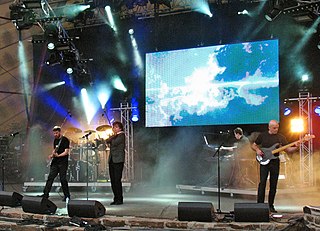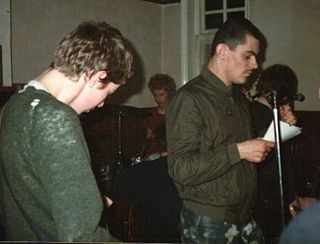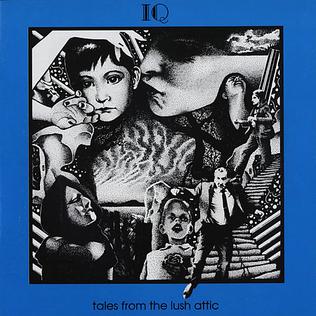
Transatlantic is a multinational progressive rock supergroup consisting of Neal Morse, Roine Stolt, Pete Trewavas and Mike Portnoy. They formed in 1999 as a side project to their full-time bands, but disbanded in 2002. They then reunited in 2009.

IQ are a British neo-progressive rock band founded by Mike Holmes and Martin Orford in 1981 following the dissolution of their original band The Lens. Although the band have never enjoyed major commercial success and had several lineup changes, IQ have built up a loyal following over the years and are still active as of 2020, currently with the original recording line-up. In 2021/22, IQ are due to perform a series of concerts in the UK and Europe celebrating their 40th anniversary.

Anthony George Banks is an English musician, songwriter and film composer primarily known as the keyboardist and founding member of the rock band Genesis. Banks is also a prolific solo artist, releasing six solo albums that range through progressive rock, pop, and classical music.
Jadis are a British neo-progressive rock group. They play guitar-driven rock with the use of synthesisers to add depth and atmosphere, and an emphasis on melody. They were previously signed to InsideOut Music.
Neo-progressive rock is a subgenre of progressive rock which developed in the UK in the early 1980s. The genre's most popular band, Marillion, achieved mainstream success in the decade. Several bands from the genre have continued to record and tour.

Nicholas D'Virgilio often referred to as NDV, is an American drummer and multi-instrumentalist musician, best known as a member of the progressive rock band Spock's Beard. He was also one of two drummers chosen to replace Phil Collins in Genesis on the Calling All Stations album. He has also done session work with many artists including Tears for Fears and Mystery, and is an official member of Big Big Train.

The Apostles are an English experimental punk rock band, who developed within the confines of the 1980s anarcho-punk scene in the UK, but did not necessarily adhere to the aesthetics of that movement.

Pure Reason Revolution (PRR) is a British rock group formed at the University of Westminster in 2003. Their music incorporates elements of progressive rock and electronic. Their music has been variously described as 'Astral Folk' and 'Progressive rock'. Members have a shared appreciation for the work of bands such as Pink Floyd, Porcupine Tree, Nirvana, Justice, Kraftwerk and Fleetwood Mac.

Enchant is an American neo-progressive rock band, formed in 1989. Their music is characterized by ambitious lyrics and melodies along with harmonic experimentation.

Tales from the Lush Attic, released in 1983, is the debut album by neo-progressive rock group IQ, following the cassette-only demo Seven Stories into Eight. It was also among the first neo-progressive releases, alongside Marillion's Script for a Jester's Tear, released in the same year.

Days Between Stations is a partnership between guitarist Sepand Samzadeh and keyboardist Oscar Fuentes Bills. They named the band after the 1985 novel by Steve Erickson. Samzadeh describes the band's sound as "art-rock", while Fuentes describes it as "post-prog".
Henry Fool are an English experimental rock band that use elements of psychedelia, progressive rock, jazz and post-rock in their music.
Mach One are a British neo-progressive rock band, founded in 1980 by a group of students attending Burlington Danes High School in West London. After a series of studio demos, school gigs and lineup changes, the band attracted the attention of Keith Goodwin who represented them through 1983-85. During this time Mach One embarked on a series of live shows at pubs and clubs around London, and universities across England, while releasing two albums Six of One and Lost for Words that featured prominently in underground progressive rock fanzines and specialist progressive rock catalogues. However, in the more mainstream press they received mixed reviews for their second album, including a humorous 1-star review by Mary Anne Hobbs in Sounds, although their live show was given a positive write-up in the same paper a few weeks thereafter by journalist Gareth Thompson.

An Ancient Lie is a compilation of prior releases by the progressive rock band Mach One. Released in 2002, it included songs like "Into The Pit" from their 1983 LP release Lost For Words, "No Time To Sleep" from their 1982 cassette release Six of One plus some never before released material such as "Machine In White" recorded in 1984 just before they disbanded.

Gathering Speed is the fourth studio album of the English progressive rock band, Big Big Train. It was released in 2004 by Treefrog Records. It is dedicated to the airmen and women who lost their lives in the Battle of Britain. The song The Road Much Further On was originally titled You Can't Draw Love. It was inspired by Spawton's then seven-year-old daughter. The album as a whole was a return to progressive rock for the band. It is the first album in which Sean Filkins recorded vocals, replacing Martin Read. It is also the only album in which Laura Murch recorded vocals, and the only Big Big Train album not to feature any songs solely written by Greg Spawton.

Going Off on One is the second live album released by the international progressive rock group The Tangent. It was released as a double CD/single DVD format, but also as a limited special edition, containing both CDs and the DVD, plus a deluxe digipack cover with enhanced artwork and extended booklet.

Slow Motion is the ninth album by the Welsh rock band Man and was released on the United Artists Records label. It was the only album recorded by this line-up, Malcolm Morley having left the day before recording was due to start. He was not replaced, so the album was recorded by the remaining four members. Unlike the previous and subsequent albums Slow Motion failed to make the UK top 40 album chart.

Pure is the eighth studio album by English neo-progressive rock group Pendragon. It was first released on October 1, 2008, as a regular edition on Toff Records, the band's own imprint, and reissued on March 14, 2011, as a special CD+DVD edition in rigid digi book through Madfish, a division label of Snapper Music. The DVD in the new special packaging has an 1hr. 24min. footage titled 'Handy-Cam Progumentary', recorded by the band themselves.
Andy Edwards is a British drummer and multi-instrumentalist musician, who is best known as former member of the progressive rock bands Frost* and IQ.













